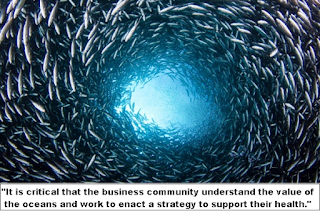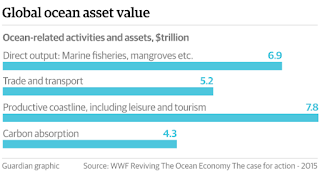June 8 is World Oceans Day, an opportunity to celebrate, reflect and act to preserve marine ecosystems. The theme of this year's World Oceans Day is, "Healthy Oceans, Healthy Planet." The world's oceans are indispensable to life on our planet and their value to the global economy exceeds $24 trillion.
Life originated in our oceans billions of years ago and they cover 70 percent of our planet. Today they are repositories for a massive array of animal and plant species, and they are crucial sources of food, medicine and energy. At an even more fundamental level they regulate the climate and produce oxygen.
In addition to being the home of countless life forms our oceans offer extraordinary beauty. Sadly, due to pollution and climate change a wide range of species are under threat. The beluga, blue whales, orcas, walrus, sea lions and manta rays are just a few of many at-risk marine species whose protection is a focus of World Oceans day.
As reported in The Guardian, a recent report commissioned by the WWF suggests that the monetary value of the world's oceans is around $24 trillion (US). The annual value of good and services provided by the oceans has been pegged at 2.5 trillion. The report further states that things like climate change are subjecting marine ecosystems to unprecedented stress. This assessment includes fisheries, tourism, shipping lanes and coastal protection provided by corals and mangroves.
The reports lead author Professor Ove Hoegh-Guldberg, indicated that it is critical for the business community to understand the value of the oceans and work to enact a strategy to support their health.
"If you don’t look after an asset like the ocean it starts to degrade so it’s important we start to solve these problems now on an international basis," he said. "The oceans are in a bad state that is rapidly getting worse."
Climate change and the resulting warming oceans are making life challenging for a number of species. It will take at least 10,000 years to reverse this trend so it is vital that we stop it before it gets any worse.
As explained by Hoegh-Guldberg, "This generation of humans is defining the future of 300 generations of humans. We are conducting these experiments with our world despite the consequences for people."
Hoegh-Guldberg offered the following dire warning, "if we don’t get off the current CO2-rich pathway we’re on now, all the attempts to control local factors won’t work."
The report calls for eight key steps to revive the health of the oceans, including a stronger focus in UN agreements on oceans, deep cuts to emissions, at least 30 percent of marine areas to be protected by 2030.
As explained in the report, "Without a healthy ocean, our future prosperity – indeed, life on Earth as we know it – is in jeopardy."
To read the full report click here.
Related
The Cost of Ocean Acidification
The Mass Extinction of Our Oceans May have Already Begun
- Blogger Comment
- Facebook Comment
Subscribe to:
Post Comments
(
Atom
)


0 comments:
Post a Comment